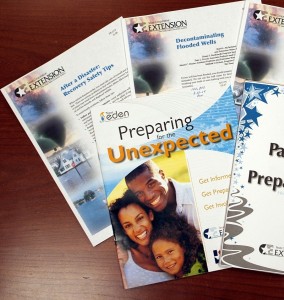By: Paul Schattenberg
COLLEGE STATION — The Texas A&M AgriLife Extension Service is supporting National Preparedness Month efforts by offering tips for Texans to help them get ready for and recover from a disaster or emergency.
The Texas A&M AgriLife Extension Service has
a
variety of publications on disaster and emergency
preparation and recovery.
(Texas A&M AgriLife Extension Service photo)
“FEMA has designated September as National Preparedness Month,” said Dr. Joyce Cavanagh, AgriLife Extension family development and resource management specialist in College Station. “We hope Texans will take this opportunity to take action to protect themselves and their families. In particular, we want them to understand the importance of knowing how to prepare and execute a disaster plan that also accounts for any specific needs that may arise, such as taking care of children, the disabled, older adults and pets.”
Cavanagh said the Texas Extension Disaster Education Network at http://texashelp.tamu.edu has information and materials on specific disasters, plus tips on disaster preparation and recovery. Materials are also available at Texas A&M AgriLife Extension Bookstore, http://www.agrilifebookstore.org in both English and Spanish versions.
Additional disaster preparedness information on current topics can be found by connecting with the AgriLife Extension on Facebook, https://www.facebook.com/agrilifeextension, Twitter, https://twitter.com/txextension, and Pinterest, https://www.pinterest.com/txextension/disaster-education.
Cavanagh said one of the best things Texans can do is map out a family evacuation plan ahead of time and practice it. She said the plan should include establishing escape routes, drawing up a floor plan and including all members of the household in a practice session.
“To establish escape routes from your house or apartment, draw up a floor plan and make sure that all family members understand the plan,” she suggested. “Each room should have two exit points. Include all members of the household when you conduct a practice session. Be sure to select a site outside the home for everyone to meet after they’ve left the house. And prepare a contact card with name, address, phone and email for each family member. Have everyone keep a copy of it in a wallet, purse or backpack for easy reference.”
Cavanagh also noted that for some types of disasters, it may be necessary to disconnect utility services to the home.
“Natural gas leaks are the top cause of fires after a disaster,” she said. “Be sure a responsible family member can turn off the gas, electricity and water supplies. Contact your local utility company for proper shut-off procedures. If there are disabled, elderly, unhealthy or non-English-speaking people in your family, you will have to take additional steps to prepare and protect them.”
She said special assistance may be available in some areas and recommended calling 211.
“If 211 is not available in your area, call the local emergency management office or fire department to ask about any special assistance programs that may be offered,” she said.
A disaster plan should also include how to care for pets, Cavanagh said.
“This might include identifying hotels or motels that accept pets or would waive a no-pets policy in an emergency and listing phone numbers and addresses of veterinarians’ offices. You may also want to identify possible pet-boarding facilities or coordinate with friends outside the area to care for the pets. You may also want to add pet food and comfort items to your emergency supply kit.”
Additional information on emergency and disaster preparedness may be found by going to the Federal Emergency Management Agency’s http://ready.gov website or its Spanish-language counterpart at http://listo.gov.




